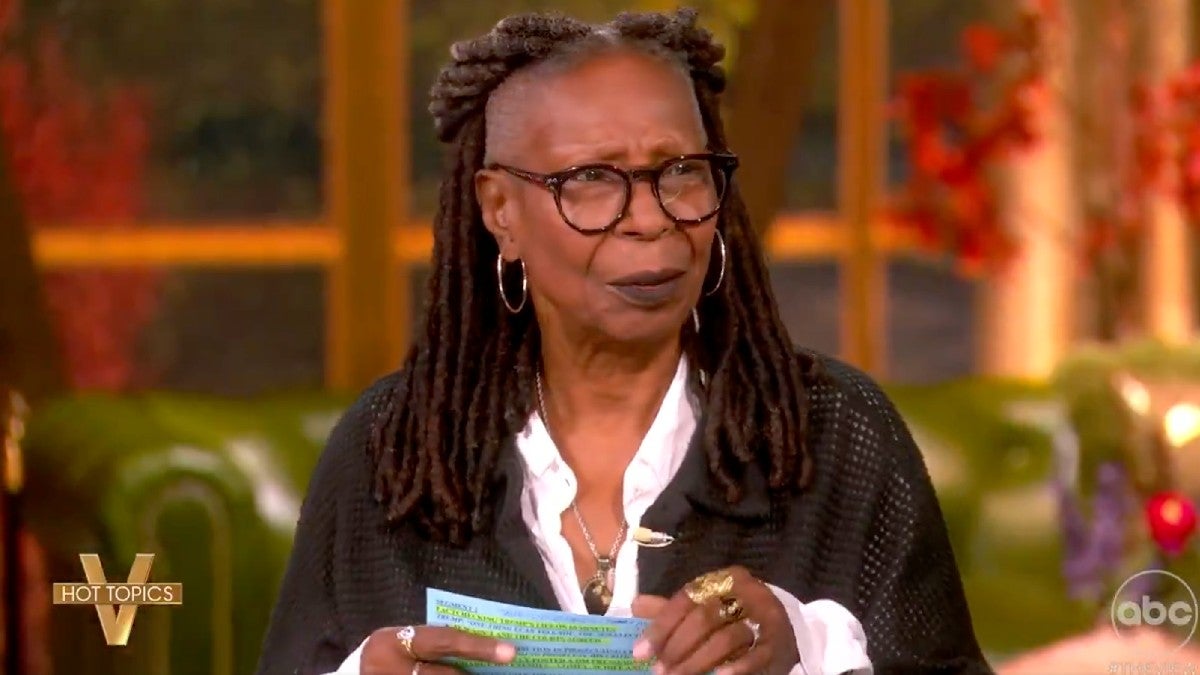Whoopi Goldberg, moderator of “The View,” recently voiced her exasperation at having to clarify a joke she made about former President Donald Trump. The incident occurred after co-host Sunny Hostin prompted Goldberg to explain a remark concerning Trump’s use of an autopen. Goldberg’s frustration underscores the growing challenge of delivering nuanced commentary in an environment where jokes and subtle implications are often misinterpreted. This article delves into the exchange, exploring the context, the reactions, and the broader implications for political humor and discourse on television.
The segment highlights the delicate balance between humor and clarity in political commentary, particularly in a highly polarized media landscape. Understanding the nuances of such interactions is crucial for anyone following current events and media trends. This analysis provides a comprehensive overview, ensuring readers grasp the full scope of the discussion and its relevance to contemporary issues.
Background of the Discussion
The contentious moment arose during a “Hot Topics” segment on “The View,” where the hosts were discussing Trump’s recent interview on “60 Minutes.” In that interview, Trump admitted he was unfamiliar with crypto billionaire Changpeng Zhao, despite having granted Zhao a pardon. This admission sparked criticism from the hosts, leading Whoopi Goldberg to quip that Trump likely used an autopen to sign the pardon, implying he wasn’t even aware of it.
This joke served as a jab at Trump, referencing past criticisms of President Biden for using autopens. The humor was intended to highlight what Goldberg perceived as hypocrisy. However, the situation quickly escalated when Sunny Hostin passed a note to Goldberg, prompting her to issue a legal disclaimer about the uncertainty of Trump’s autopen usage. The disclaimer was the catalyst for Goldberg’s outburst.
Whoopi Goldberg’s Frustration
Whoopi Goldberg did not take kindly to the need for clarification. “Well, I’m sorry,” she said, exasperated. “You know, the hardest thing about this job now is no one understands nuance. You know when you hear a joke, when somebody’s fooling around, when they’re not saying something specific, especially on this show!” She emphasized that she is always explicit when making serious points and that her joke should have been easily recognized as such.
Goldberg tore up the note in frustration, underscoring her annoyance with the situation. Her reaction highlights the growing tension between comedic expression and the demand for precise, literal interpretation in media. This tension is particularly acute in political commentary, where humor can easily be misconstrued or weaponized.
Co-hosts’ Reactions
Alyssa Farah Griffin reacted with a laugh, noting, “I love when Sunny passes notes.” This lighthearted response provided a brief moment of levity amidst the tension. However, it also underscored the behind-the-scenes dynamics of the show, where legal and ethical considerations often intersect with spontaneous commentary.
The co-hosts’ reactions reflect the broader challenge of navigating sensitive topics in a live television environment. While some may see Goldberg’s joke as harmless humor, others might view it as a potentially misleading statement requiring clarification. This difference in perspective underscores the complexities of modern media production.
The Nuance Debate
Goldberg’s central complaint was that “no one understands nuance.” She argued that viewers should be able to discern when she is joking versus making a serious point. This sentiment echoes a broader concern about the decline of nuanced understanding in public discourse. In an era dominated by sound bites and social media snippets, subtle humor and complex arguments often get lost.
The debate over nuance is not new, but it has taken on added significance in the digital age. The ability to convey and interpret subtle meanings is essential for healthy communication. Goldberg’s frustration serves as a reminder of the importance of critical thinking and contextual understanding in media consumption.
The Autopen Context
The reference to an autopen carries its own implications. An autopen is a device that automatically signs documents using a replica of a person’s signature. Its use by political figures can raise questions about their direct involvement in decision-making processes. Critics often argue that relying on autopens suggests a lack of personal oversight.
By joking about Trump using an autopen for Zhao’s pardon, Goldberg was subtly questioning the former president’s attention to detail and his awareness of the pardons he issues. This layer of political commentary adds depth to the joke, making it more than just a simple quip. The autopen reference taps into broader concerns about accountability and transparency in government.
Broader Implications for Media
The incident on “The View” highlights the challenges faced by media personalities in today’s environment. The need to constantly clarify and defend statements can stifle creativity and spontaneity. This, in turn, can lead to a more cautious and less engaging form of commentary. The pressure to avoid misinterpretation can sometimes overshadow the goal of sparking meaningful conversation.
Moreover, the episode underscores the increasing polarization of media consumption. Viewers often interpret comments through the lens of their political affiliations, making it harder to find common ground or appreciate differing viewpoints. In this context, even well-intentioned humor can become a source of division and controversy.
Conclusion
The exchange between Whoopi Goldberg and Sunny Hostin on “The View” offers valuable insights into the complexities of modern media commentary. Goldberg’s frustration with the perceived lack of nuance highlights the challenges of delivering political humor in a hyper-sensitive environment. The incident underscores the importance of critical thinking, contextual understanding, and nuanced communication.
As media continues to evolve, it is essential for both creators and consumers to navigate the delicate balance between humor, clarity, and responsible reporting. The ability to appreciate and engage with diverse perspectives is crucial for fostering a more informed and understanding society. This episode serves as a reminder of the ongoing need for thoughtful dialogue and the importance of not losing sight of nuance.

Leave a Reply